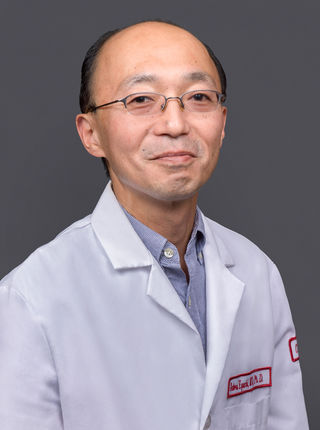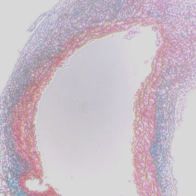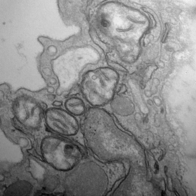Satoru Eguchi, MD, PhD, FAHA
Professor, Cardiovascular Sciences
Professor, Aging + Cardiovascular Discovery Center (ACDC)
Professor, Center for Metabolic Disease Research
Professor, Sol Sherry Thrombosis Research Center

- Contact Information
-
- About Me
-
Research Interests
Satoru Eguchi MD PhD FAHA started his academic career as a physician scientist in Japan concentrating on cardiovascular endocrinology in 1989. His research has been specifically focused on cardiovascular GPCR signal transduction and its functional significance linked to cardiovascular diseases. In 1994, he joined the lab of Dr. Tadashi Inagami (Vanderbilt University), a highly recognized scientist in the area of renin-angiotensin research. After gaining invaluable experience, Dr. Eguchi successfully completed his postdoctoral training in 1996. His J Biol Chem (273:8890-6, 1998) publication with Dr. Inagami regarding the EGF receptor transactivation mechanism by angiotensin II (Ang II) in cultured vascular smooth muscle cells (VSMCs) has been sited more than 400 times, which helped him become independent and obtain extramural funds. Since then, Dr. Eguchi and his research group have been recognized as one of the leading authorities of Ang II signal transduction and the functions linked to vascular pathophysiology.
He has been a member of several American Heart Association (AHA) Study sections including chair (Endothelial Biology), and Ad hoc member of several study sections of the National Institutes of Health (NIH) in the USA. He has been funded by grants from NIH and the AHA. He is also a recipient of the AHA National Established Investigator Award (2006). He is currently Associate Editor of Clinical Science and an editorial board member of several high impact journals including Circulation Research, Arteriosclerosis Thrombosis and Vascular Biology, Hypertension, American Journal of Physiology (Cell Physiology & Heart Circulation), and American Journal of Hypertension. He was recently selected as a Superior Editorial Consultant (Circulation Research 2010 & 2011) and the Top 5 reviewers (Hypertension 2011-2014). He has published over 130 original papers and many review articles and editorials. His current focus of research relates to molecular, cellular and vascular mechanisms of pathophysiological vascular remodeling. He has a particular interest in the cardiovascular signaling mechanisms and their translational aspects.
The renin-angiotensin-aldosterone system is recognized as one of the most important research targets in cardiovascular pathophysiology. Notably, Dr. Eguchi has created a novel and fundamental research program to study the molecular mechanisms of the EGF receptor transactivation by AngII together with its significance in mediating cardiovascular remodeling. Also, his research group is especially talented at manipulating the AngII/GPCR-linked key signaling molecules with multiple applications of molecular biology tools, both in vitro with primary culture and in vivo with rodent vasculature. This approach has yielded seminal discoveries of potential target molecules and their detailed molecular mechanisms in mediating vascular remodeling. Moreover at the CVRC with Dr. Rizzo, Dr. Scalia and Dr. Autieri as key collaborators, his research includes in vivo analysis of the AngII signal transduction using adenoviral mediated gene transfer as well as Ang II infusion to the mice for evaluation of hypertension and associated vascular damage in multiple organs including abdominal aortic aneurysm (AAA).
The Eguchi lab employs three different research strategies. 1) Eguchi lab creates viral and non-viral expression vectors including miRNA based-gene silencing and mutagenesis. Creation of tissue-specific engineered mice for translational research is also ongoing. 2) Eguchi lab is famous for its excellent cell biology/signal transduction research using primary cultured vascular cells and advanced techniques for signal transduction research. 3) Eguchi lab is actively working on animal experiments using tissue-specific gene knockout mice such as sm22alpha (SMC) Cre-driver mice where vascular ADAM17 (an upstream metalloprotease for EGFR activation) or EGFR is silenced. Cardiovascular pathophysiology is induced in mice with osmotic mini-pump infusion of Ang II to induce organ damage (vascular and cardiac hypertrophy and cardiac and renal fibrosis) and AAA. In addition, surgery such as carotid artery partial ligation is performed to induce disturbed flow-mediated vascular inflammation and hyperplasia.
Eguchi lab is regarded as one of the top labs in TUSM in terms of training, publishing, and research. Potential students and fellows can expect to learn balanced research strategies, use up to date methodologies for experimentation and project management, and be guided into key research directions from a dedicated and experienced mentor and senior fellows.
- Education, Training & Credentials
-
Educational Background
- Fellowship, Vanderbilt University School of Medicine, Nashville, TN, 1994
- PhD, Tokyo Medical and Dental University, Tokyo, Japan, 1993
- MD, Tohoku University School of Medicine, Sendai, Japan, 1987
- Publications
-
Digital Bibliography


